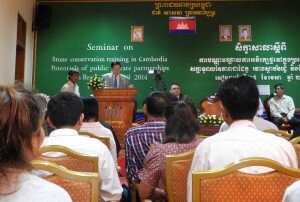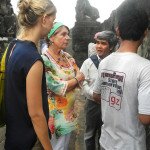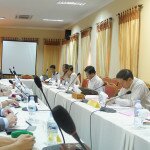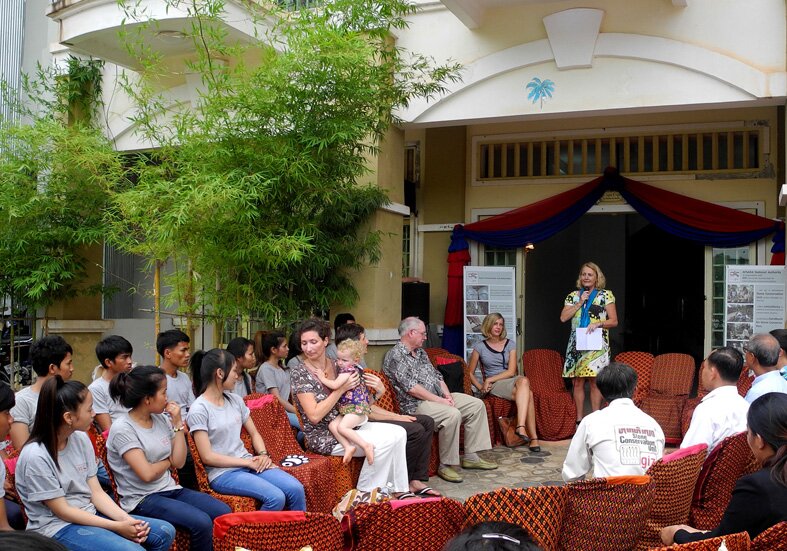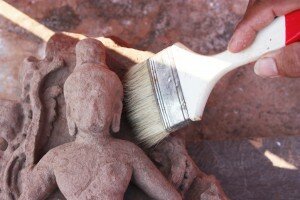
Stone Conservation
Saving the smile of the Apsaras
Cambodia is a country in the process of recuperation after long and consuming wars. As Cambodia starts to recover, signs of the new beginning can be seen everywhere. In this process the temples of Angkor are playing an important political and spiritual role in the rebirth of self-confidence of the Cambodian people. The Angkor World Heritage Site therefore is of utmost importance for the reconstruction of the Cambodian state and the rejuvenation of the Cambodian people.
Preservation of the temples for generations to come
Since 1995 the German Government has supported projects focused on the conservation of the temples. 1997 saw the beginnings of the German Apsara Conservation Project (GACP) in close cooperation with the Authority for the Protection and Management of Angkor and the Region of Siem Reap (APSARA) under the cultural preservation program. The project is focusing on the conservation of the marvelous carvings and bas-reliefs that can be found in the Angkor Wat area. The project aims at preventing further decay of these awe-inspiring Khmer temples.
Skills development for stone conservation
Since 2007, German Development cooperation is supporting the APSARA Authority with setting up a permanent Stone Conservation Unit (SCU). The Unit carries out conservation treatments in the Angkor Park and offers consultancies to other conservation projects. In order to build professional expertise for sustainable stone conservation at UNESCO’s World Heritage site, the APSARA Stone Conservation Unit provides vocational training for Cambodians in conservation and restoration. The training is based on a “Handbook for stone conservation in Angkor” that is available in Khmer and English.
The timeless smile of the Apsaras is only one of the many miracles that the Temples of Angkor provide for the generations to come.
Seminar on Stone Conservation Training in Cambodia – Potentials of public private partnerships
28 April 2014
SIEM REAP, Cambodia–APSARA National Authority and GIZ recently organized a seminar on vocational training in stone conservation in Cambodia as part of a study to determine the annual demand of trained stone conservation experts inside and outside of Angkor Park and who might be interested in contributing to a long-term vocational training program for stone conservation.
Angkor is an outstanding UNESCO World Heritage site and people around the world are increasingly gaining awareness of the importance and its central role in the Khmer civilization. But there are many more ancient sites all over Cambodia that have not received comparable attention, as all temples of Angkor are in critical need of conservation. At present, the government of Cambodia is unable to suitably protect and preserve these sites due to a lack of sufficient financial and human resources.
Representatives from the Ministry of Culture and Fine Arts (MOCFA), APSARA National Authority, national and international conservation teams working in Angkor, UNESCO, as well as private companies were invited to visit the facilities of the APSARA Stone Conservation Training Center and to attend the seminar held last month. The director general of APSARA, H.E. Bun Narith and other Excellencies and guests from APSARA, as well as GIZ country director, Mr. Adelbert Eberhardt also attended the meeting.
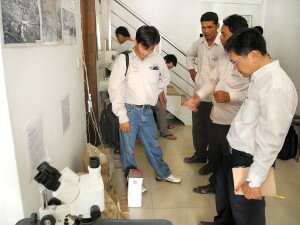
Representatives of the Ministry of Culture, APSARA Authority and international conservation teams visiting the APSARA Stone Conservation Training Center.
GIZ advisor Ms. Josephin Rösler and conservation expert Mr. Long Nary presented the study objectives and introduced participants to the APSARA Stone Conservation Training Program.
As part of the study, questionnaires were distributed to participants. The information gathered from this study will be used to determine if a long-term vocational training program for stone conservation is feasible for the future.
To ensure heritage site conservation is carried out in the best way possible in the future, all stakeholders will need to prioritize investing in vocational training. There will be a role for everyone to contribute to, including the government, international donors, as well as the private sector.
For more information, please contact: Josephin Rösler (email: [email protected])
German Delegate Discusses Future of Conservation with APSARA
22 April 2014
Siem Reap, Cambodia–On April 22, Ms. Ludgera Klemp, counselor of the German Embassy visited the APSARA Stone Conservation Unit (SCU) and the Stone Conservation Training Center in Siem Reap. During the visit, Ms. Klemp met trainees and discussed their motivations and learning experiences with them.
That afternoon, Ms. Klemp also met the Director General of APSARA National Authority, H.E. Bun Narith and other delegates of APSARA. During the meeting, APSARA was informed that UNESCO, the German
Embassy and the Ministry of Culture and Fine Arts (MOCFA) are trying to integrate the protection of the cultural heritage sites of Angkor in the National Social Development Plan 2014-2018 process, with APSARA playing an integral part in the preservation of the sites.
APSARA committed to initiate the first steps regarding the certification of the stone conservation training.
For more information, please contact: Ms. Josephin Rösler (email: [email protected])
US Ambassador David Lane Meets Stone Conservation Unit in December 2013
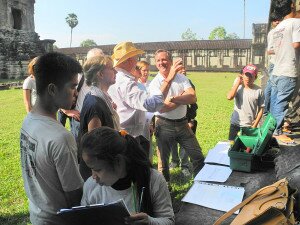
H.E. David Lane, US Ambassador to the United Nations Agencies in Rome meets trainees of the stone conservation unit at Angkor Wat temple
08 December 2013
SIEM REAP, Cambodia – H.E. David Lane, US Ambassador to the United Nations Agencies in Rome toured Angkor Park in December 2013. At Angkor Wat, he met the trainees of the Stone Conservation Unit (SCU) who were taking part in a workshop withICCROM (International Centre for the Study of the Preservation and Restoration of Cultural Property) consultant and conservation expert Simon Warrack.
During the workshop, students studied chisel marks on an unfinished wall to determine what tools the ancient stone carvers used.
“In his way they can understand how their ancestors carved the temple,” Simon Warrack explained. “Later, they will actually carve some sandstone using these traditional techniques.” By understanding how the temples were built, the students improve their ability to preserve them into the future.
The US Mission to the United Nations supports the conservation of cultural heritage, such as preservation projects at Angkor Wat and Phnom Bakeng.
APSARA Stone Conservation Training Center meets growing demands of conservators in Cambodia
Siem Reap, Cambodia On 29 March 2013, APSARA’s Stone Conservation Unit held the official opening ceremony for the new Stone Conservation Training Center. The Center will provide a new space for knowledge exchange in the field of conservation and restoration. With the aim to support the increasing demands of qualified conservators in Cambodia, the space includes a classroom, office, a small laboratory and workshop, as well as a library and meeting room.
H.E. Ros Borath, Deputy Director of APSARA National Authority; German Ambassador, H.E. Dr. Wolfgang Moser; GIZ Deputy Country Director Dr. Petra Schill; Madame Mao Loa, Director of the APSARA department DCMA; GIZ Advisor JosephinRösler and the Stone Conservation Unit, as well as a number of guests from APSARA and international conservation teams attended the ceremony.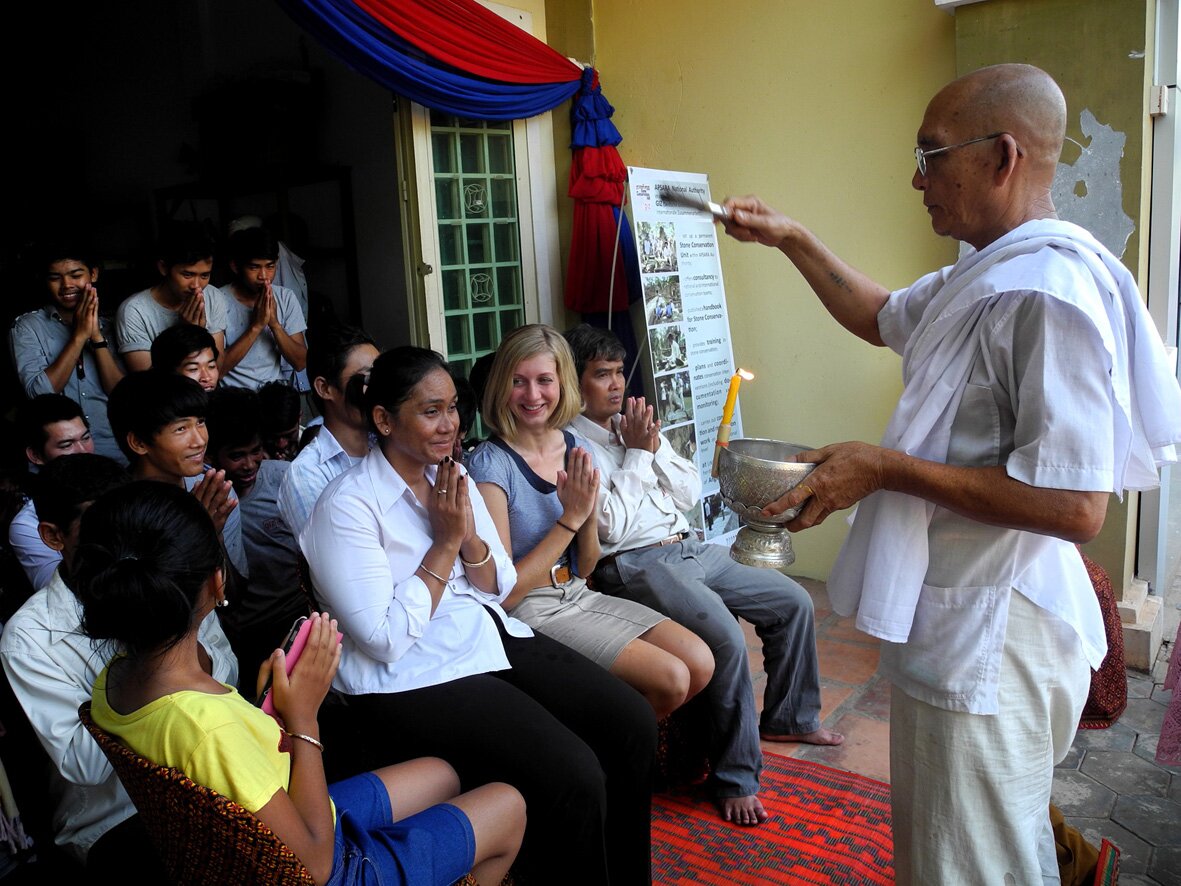
APSARA’s 2-year-stone conservation training was launched in March 2013. Three local stone conservation experts from the Stone Conservation Unit are teaching theory and practice. Other conservation and science professionals with expertise in archaeology, mineralogy, history and microbiology will provide specialized trainings. Until recently, it was not possible to study stone conservation in Cambodia. With this new training programme, APSARA is now able to train new conservators on international standards.
Twenty young Cambodians to become stone conservation experts
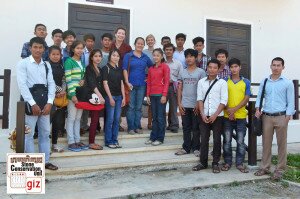
21 February 2013
Siem Reap, Cambodia - The APSARA Stone Conservation Unit (SCU), in cooperation with GIZ, recently launched a new training program for 20 young Cambodians to become stone conservation experts. In February 2013, GIZ handed over necessary training equipment and a new vehicle to the APSARA SCU to ensure safe and reliable access to remote stone conservation field sites.
“We are very happy that we can finally launch the training program. Our SCU Experts have been working hard during the last 2 years to make this training happen. Training local conservators and providing work opportunities is a major step towards Cambodia’s development process. The demand on skilled and well trained conservators is high since in Angkor region alone there are hundreds of temples in urgent need of conservation. This could mean many secure incomes for local conservators and ultimately reducing poverty.”
The training program is the only of its kind in Cambodia, and is addressing the urgent need to train stone conservationists from within-in. The program builds local capacities, contributes to the countries’ rich tradition of stone carving and aims to keep conservation in the hands of the people the historical sites belong to In 2012 the project has published a training handbook for stone conservation in English and Khmer languages compiling the practical work and techniques of conservators while working on-site. The lectures for the training and a detailed curriculum have been developed.
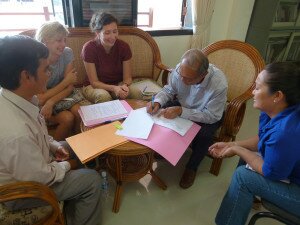
For more information on The APSARA Stone Conservation Unit Project with GIZ, please contact:
Ms. Josephin Rösler
Tel: +855 12 229 547
Email: [email protected]
